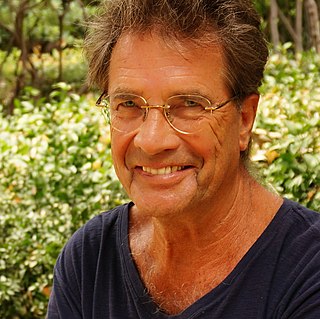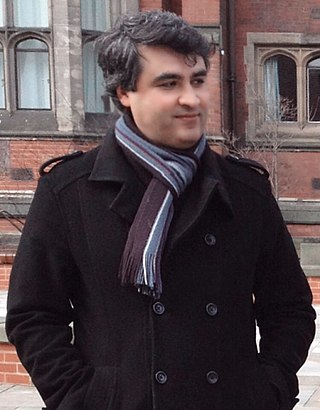Critical discourse analysis (CDA) uncovers the hidden meanings embedded in texts and conversations. It analyses the way the language used reinforces power relationships, social hierarchies, and ideologies.
Discursive psychology (DP) is a form of discourse analysis that focuses on psychological themes in talk, text, and images.
Norman Fairclough is an emeritus Professor of Linguistics at Department of Linguistics and English Language at Lancaster University. He is one of the founders of critical discourse analysis (CDA) as applied to sociolinguistics. CDA is concerned with how power is exercised through language. CDA studies discourse; in CDA this includes texts, talk, video and practices.

Teun Adrianus van Dijk is a scholar in the fields of text linguistics, discourse analysis and Critical Discourse Analysis (CDA).
Corpus-assisted discourse studies is related historically and methodologically to the discipline of corpus linguistics. The principal endeavor of corpus-assisted discourse studies is the investigation, and comparison of features of particular discourse types, integrating into the analysis the techniques and tools developed within corpus linguistics. These include the compilation of specialised corpora and analyses of word and word-cluster frequency lists, comparative keyword lists and, above all, concordances.
In language learning research, identity refers to the personal orientation to time, space, and society, and the manner in which it develops together with, and because of, speech development.
The Essex School of discourse analysis, or simply 'The Essex School', refers to a type of scholarship founded on the works of Ernesto Laclau and Chantal Mouffe. It focuses predominantly on the political discourses of late modernity utilising discourse analysis, as well as post-structuralist and psychoanalytic theory, such as may be found in the works of Lacan, Foucault, Barthes, and Derrida. Discourse analysis, according to its own terms at least, seeks to "unfix and destabilise" the accepted meanings of everyday language, and to reveal how the dominant discourse "marginalises and oppresses... equally valid claims to the question of how power could and should be exercised."
Gerard Delanty is a British-based sociologist and Professor of Sociology and Social & Political Thought at the University of Sussex. He is also the editor of European Journal of Social Theory.
Feminist post-structuralist discourse analysis (FPDA) is a method of discourse analysis based on Chris Weedon's theories of feminist post-structuralism, and developed as a method of analysis by Judith Baxter in 2003. FPDA is based on a combination of feminism and post-structuralism. While it is still evolving as a methodology, FPDA has been used by a range of international scholars of gender and language to analyse texts such as: classroom discourse, teenage girls' conversation, and media representations of gender. FPDA is an approach to analysing the discourse of spoken interaction principally.

Johannes Angermuller is a discourse researcher in linguistics and sociology. He is Professor at Open University. He is also affiliated to CEMS/EHESS in Paris and the Centre for Applied Linguistics at Warwick (UK). He mostly lives in London and Paris.
Mediated stylistics or media stylistics is a new and still emerging approach to the analysis of media texts. It aims to take seriously two ideas: first, that media texts involve 'the construction of stories by other means'; and second, that in an age marked by digital connectivity, media texts are inherently interactive phenomena. To meet this twofold aim, mediated stylistics has brought together the analytic toolkits of discursive psychology—which is finely attuned to the contextual specificities of interaction—and stylistics—which is finely attuned to the grammatical/rhetorical/narratorial specificities of texts as texts. Recent research in which mediated stylistics has been put to work, for instance, has shown how mediated representation of issues like sexism, sexualisation, alleged rape and violence against women can differ, and differ in rhetorically consequential ways, from the original un-mediated source material.
Bethan Benwell, is a British linguist. She has been a senior lecturer in English Language and Linguistics, for the Division of Literature and Languages, at the University of Stirling since 2008.
Susan "Sue" Speer C.Psychol, FHEA is a senior lecturer at the School of Psychological Sciences, University of Manchester.
Susan Lynn Ehrlich is a Canadian linguist known for her work in both language and gender, language and the law, and the intersections between them. She studies language, gender and the law, with a focus on consent and coercion in rape trials.

Judith Baxter was a British sociolinguist and Professor of Applied linguistics at Aston University where she specialised in Gender and Language, and Leadership Language. She served in editorial positions with several academic journals.

Majid KhosraviNik is a Senior Lecturer in Digital Media and Discourse Studies at Newcastle University, UK.
Paul Baker is a British professor and linguist at the Department of Linguistics and English Language of Lancaster University, United Kingdom. His research focuses on corpus linguistics, critical discourse analysis, corpus-assisted discourse studies and language and identity. He is known for his research on the language of Polari. He is a Fellow of the Academy of Social Sciences and a Fellow of the Royal Society for Arts.
Jane Sunderland is a British linguist and playwright. She is currently an honorary reader in gender and discourse at the Department of Linguistics and English Language of Lancaster University, United Kingdom. Her research focuses on language and gender, Identity and language learning and critical discourse analysis.
Greg Myers is an American linguist. He is currently an Emeritus professor at the Department of Linguistics and English Language of Lancaster University, United Kingdom. His research focuses on applied linguistics with a special focus on critical discourse analysis.
Veronika Koller is an Austrian-British linguist. She is Professor of Discourse Studies at the Department of Linguistics and English Language of Lancaster University, United Kingdom. Her research focuses on critical discourse analysis.





